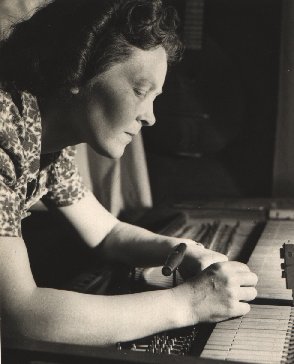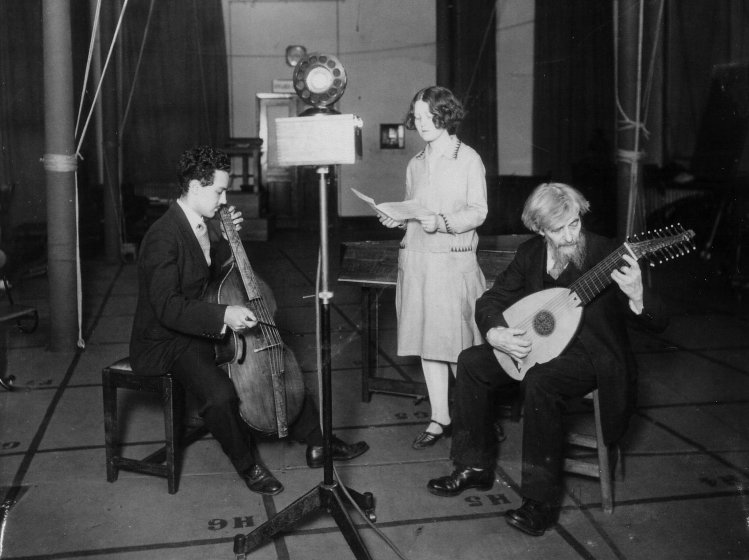Carl F. Dolmetsch C.B.E. Hon D. Litt. F.T.C.L. F.L.C.M.
(1911 - 1997)
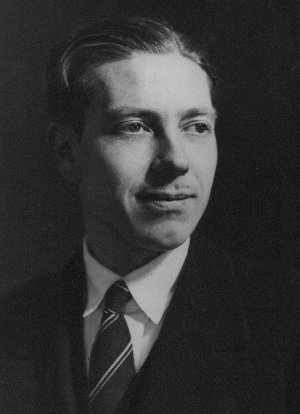
We are grateful to the late Richard Noble, former editor of The Consort, for providing much of the content in the Obituary printed below.
The death of Dr. Carl Dolmetsch, at the age of 85, on Friday 11 July, while undergoing treatment at the Haslemere Hospital for non-Hodgkin's lymphoma, removes from the scene one of Haslemere's most famous and best loved citizens and on the international stage one of the foremost pioneers in the early music revival that has now taken such a hold on the musical world. Resident in Haslemere since 1917, his fame as a virtuoso recorder player was synonymous with the town which became his base, attracting musicians and music lovers from across the globe to attend the annual Haslemere Music Festival and to enjoy the hospitality of the town. Haslemere owes him much and will mourn him greatly.
Carl Frederic (born Charles Frédéric) was the youngest of the four children of Arnold Dolmetsch and his third wife, Mabel. He was born at Fontenay-sous-Bois in France on 23 August 1911 at the time when his father was working for Gaveau in Paris, but the family returned to England in 1914 and finally settled in Haslemere in the winter of 1917 where his whole life from early childhood was centred.
It was Arnold Dolmetsch's policy to ensure that his children grew up to become versatile on a wide range of early instruments in order to form a meaningful family consort but each excelled most especially on one instrument or another. Carl's elder brother, Rudolph, became a brilliant harpsichord player and a very able executant of the viol and viola da gamba but later moved on to study conducting and to form his own orchestra, led by Olive Zorian, and he was just establishing himself as a very promising composer when war broke out. He joined the Royal Artillery and was tragically lost at sea when his ship, the S. S. Ceramic, was torpedoed by the German submarine U-515 in mid-Atlantic on 6 December 1942. Carl's eldest sister, Cécile, who survived him only a matter of weeks (see here), specialised in playing the pardessus de viole and became a leading exponent on this rare instrument. His younger sister, Nathalie, who predeceased him, excelled on the viola da gamba for which she edited much valuable music as well as writing a successful tutor. Nathalie inherited many of the talents and interests of both her parents and was active in early dance as well as in early music. Carl himself, while very proficient on the viol and the violin, centred his attention on the recorder and lifted its status from a rather obscure early wind instrument to one of considerable significance.
Carl's particular contribution to modern recorder making is as well known in musical circles as is George Washington's association with cherry tree and axe! Arnold wrote in his diary "Concert Londres, Grand succès. Baba abandonne mon sac à main contenant le recorder et mes outils etc. à Waterloo en face de la plateforme No. 5. Désespoir! Belle journée." (AWG refers to The Art Workers' Guild Hall the venue for the concert). The family continued to give concerts in London after their move to the Surrey countryside, events that commenced and concluded with the journey between London Waterloo and Haslemere by rail. After one concert a moment's inattention on the part of a young Carl led to the bag containing tools and a precious antique treble recorder being left behind on the Waterloo platform. The loss was not discovered until the journey was well underway - it must have been accompanied with much consternation and recrimination. Despite the offer of a reward the instrument and tools appeared lost forever. Arnold, never one to shirk any task, set about designing and building his first modern recorder - work completed to his satisfaction in 1918 when he was 60 years old. Over the course of the next seven years descant, tenor and bass recorders were added and the first complete consort of Dolmetsch recorders was heard in performance at the 1926 Haslemere Festival. Arnold passed responsibility for the research and production of recorders to Carl in 1926.
Carl received all his early musical education under his father but he also studied with Carl Flesch and Antonio Brosa. He performed as a youthful soloist in the very first Haslemere Festival, founded by his father in 1925, and was able to boast that he had performed in every subsequent Festival right up to the 72nd in 1996 and he personally directed every Festival from 1940, the year his father died. Last year he handed over the directorship of the Festival to his daughter Jeanne.
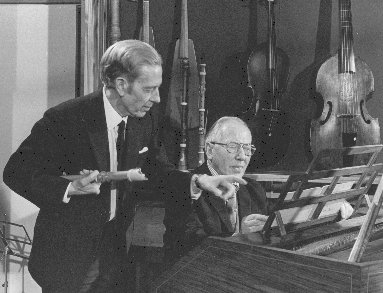
Carl Dolmetsch and Joseph Saxby
In the meantime his career as a virtuoso recorder player took flight in the 1930s when he formed an historic partnership with Joseph Saxby (see Joseph's obituary) as his accompanist after a chance encounter at the Oxford Playhouse in 1932. It was a partnership that was to endure for sixty years with several notable debuts in America and Europe before the Second World War.
In 1937 he became a founder-member with Edgar Hunt and others and first musical director of the Society of Recorder Players. In 1939 in company with Joseph Saxby he gave the first of 45 annual Wigmore Hall recitals, occasionally with the assistance of other artists. Unlike his father, Carl was not just an early music specialist but a musician of much wider vision. For these occasions he invariably commissioned a new work featuring the recorder from a wide range of contemporary composers and gradually a significant repertoire of new music for the instrument in various combinations was built up with notable contributions from such composers as Lennox Berkeley, York Bowen, Herbert Murrill, Arnold Cooke, Cyril Scott, Francis Chagrin, Hans Gál, Gordon Jacob, Nicholas Maw, Stephen Dodgson, Jean Françaix and a series of very durable works from Edmund Rubbra. This repertoire added variety and spice to the world-wide concert tours upon which Carl and Joseph increasingly embarked, visiting Australia, New Zealand, Japan, Canada and the United States of America, where they undertook no less than twenty coast-to-coast tours over the years and from where they brought back yet more new music to add to the old. The importance of individual teachers and performers is paramount in the recorder world and influences are easily traced. After hearing Carl Dolmetsch, the Dutch artist Kees Otten took up the recorder, to become Frans Brueggen's teacher, a line which continues today (quoted from an article by Mervyn Harris about the famous oboeist Henri de Busscher).
During the Second World War the Dolmetsch workshops turned to making parts for aircraft but concerts continued throughout that dark period raising funds for the Free French and other war charities. In this way, the Haslemere Festival, unlike so many others, could boast a genuine continuity from 1925 to the present day. The war work brought the Dolmetsch firm into contact with many 'new' materials' including 'plastics' and from this experience began one of the most commercially fruitful periods for the Dolmetsch firm.
Carl personally invented and developed the inexpensive plastic recorder which did much to promote the instrument for use in schools and his work in music education has had wide ranging consequences and led to his being appointed C.B.E. (Commander of the British Empire) in 1954. In 1960 the degree of honorary D. Litt. was conferred upon him by Exeter University. He was also elected an honorary Fellow of Trinity College of Music and of The London College of Music. At all times he remained faithful to his father's aesthetics and maintained the Haslemere Festival his father had founded in exactly the way he would have wished, zealously guarding the essential teaching his father had set in motion for future generations and it is largely due to this zeal that the promotion of early music on authentic instruments and in period style has flourished in the positive way it has today, being accepted in a manner his father could barely have dreamed about when he undertook his pioneering work a century ago. He also maintained his father's workshops for the manufacture of early music instruments and most especially for the recorder which still flourishes under changing conditions to this day under the direction of his twin daughters Jeanne and Marguerite. Arnold Dolmetsch had been a member of the Art Workers Guild, a 'medieval inspired' association established by William Morris and his colleagues and including the finest craftsmen and women. Dr. Carl was himself a member (or 'brother' to use the correct term) and was elected Master in 1989.
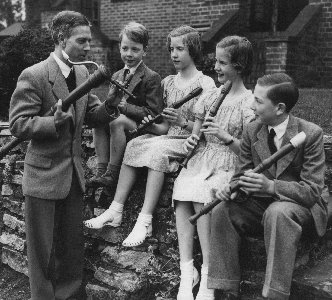
Dolmetsch Family Consort (1952)
left to right: Carl, Richard, Jeanne, Marguerite and François
In 1937 Carl married Mary Ferguson, who had come down from Scotland to study music in Haslemere. Her organising ability did much to set Carl up upon his international career and to establish the Haslemere Festival and other Dolmetsch enterprises on a firm financial footing and they were to enjoy a family of four. François, the eldest, did not take up music professionally but, after taking his degree at Cambridge, became a successful photographer based in Colombia. In recent years he has returned to music, establishing and playing in a chamber music group in Cali and being appointed general manager of the Orquesta Sinfonica del Valle, based in Cali, which gives over 250 concerts every year in Colombia and abroad. Jeanne and Marguerite have remained in Haslemere where they have meticulously upheld the Dolmetsch musical traditions both as performers and as craftswomen. Richard, the youngest, showed enormous musical talent and won the Gold Medal of La Royaume de Musique in Paris in 1961, but his life became dogged by illness and he died very tragically in 1966 at the ago of 21, a loss from which his father could never fully recover. By then Carl's marriage had been dissolved but, from the mid-1960s his professional and domestic life was organised by his secretary (who had been originally engaged as a nanny for Jeanne, Marguerite and later Richard during the 1940s) and who he married at Jesses on May 15th 1997, when he was already in very poor health. He lived to enjoy the company of six grandchildren and towards the end of his life a visit from his great grandson, Francisco. Mary Dolmetsch died at her home, Easter Greybield, Peebles, Scotland on 15 October 1996 after a long illness.
In Haslemere, as in so many other places, Carl will be especially remembered for the warmth of his personality whenever he stood before an audience. He delighted to come forward when performing a perhaps unfamiliar piece in a concert to add some additional information that had been inadvertantly omitted from the printed programme notes. On the rare occasion when something went wrong he would immediately share a spontaneous joke with his listeners before starting again and had a rare ability to make his audiences feel part of the show. After a long and perhaps taxing programme he would always be available to greet old friends and to welcome complete strangers who might want to come forward to shake his hand and express appreciation of the concert. Many who were close friends first met him in this way. The rapport he generated made the Haslemere Festival a very friendly event to attend and to which music lovers from across the world were eager to return. Not many artists could claim that kind of bonhomie or project that kind of charm.
With his passing, together with that, a few weeks earlier, of his long standing and much loved accompanist, Joseph Saxby, whom Carl regarded as his right arm, we come to the end of an era, but the Haslemere Festival, so dear to his heart, will continue to flourish in the able hands of his family, uplifted by his example.
The funeral took place on Thursday 17 July at St. Bartholomew's Church which was, coincidently, the day of the first concert of the 73rd Haslemere Festival and was to be the venue, on Sunday 20 July for the closing concert, a programme of words and music celebrating the remarkable people who lived and worked in and around Haslemere, entitled "Over the Hills and Far Away".
Dr. Carl has secured the future of the family's involvement in early music in Haslemere by leaving all his property including The Dolmetsch Library, his personal library including those twentieth century works written for him by many of the centuries leading composers and all the letters relating to their commission, preparation and performance, his personal library of early music and his musical instruments to his three children, Jeanne, Marguerite and François.
Reference:
- Carl Dolmetsch - Obituary (The Independent)
- Cecile Dolmetsch - Obituary (The Independent)
